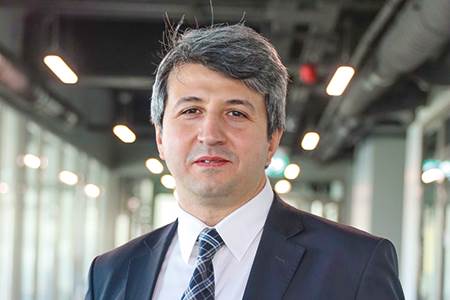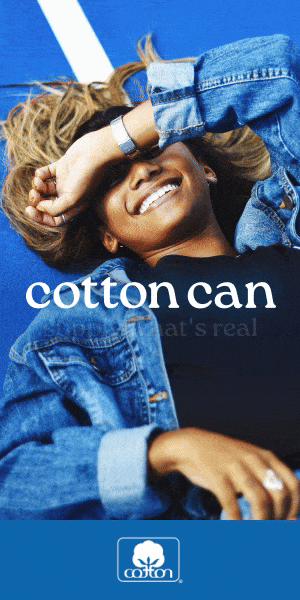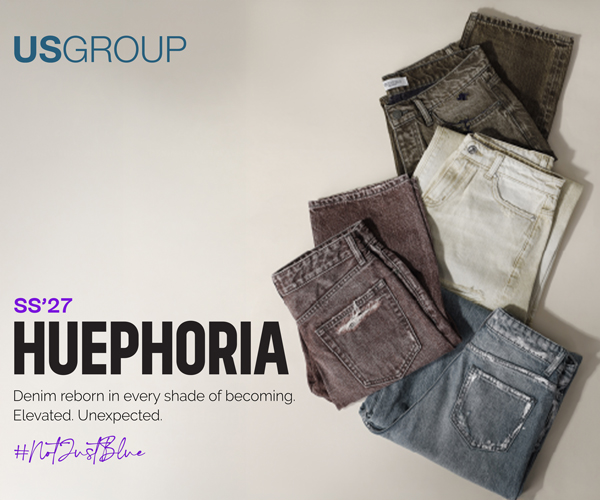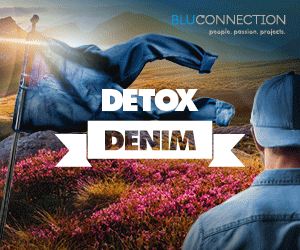“It’s vital to invest in new ideas”

Halit Gümüser, a director of Kipas, believes in collaborative approaches to innovation, partnering multiple companies to create new products, with a particular focus on recycled content. The Turkish mill is one of the driving forces behind the Sustainability Talks Istanbul, which takes place in November. It will unite industry players, pass on best practice and create opportunities for start-ups and investors.
Q: Why are the Sustainability Talks Istanbul important and what are your goals?
A: We know that sustainable manufacturing is essential to create a better world, which is why we joined forces with Orbit Consulting to create the Sustainability Talks Istanbul. Orbit collaborates with umbrella organisations, governmental institutions and NGOs to help drive sustainable practice in the Turkish textile industry. We wanted to share our learnings and our practices to make a change for everyone. There are lots of events on sustainability, especially about textiles, however, we think the content can be quite similar or repetitive. This year, we wanted to take a different approach.
One of our topics will be the benefit of artificial intelligence for sustainability. We will highlight new water usage and green systems, and discuss brands’ strategies in terms of carbon footprint. We will analyse legislation – for instance, the incoming European Union laws concerning textiles and circularity. DuPont will present the recycling of protective apparel, and regenerative and organic cotton projects in Turkey will also be discussed.
How will the approach be different to previous events?
The event itself will be different because associations such as Dornbirn Global Fibre Congress (GFC), Textile Exchange and International Textile Manufacturers Federation (ITMF) will present their annual outlooks. We’re collaborating with these important partners who can share their vision with our audience.
Additionally, we will have a start-up and scale-up investment session. We are inviting companies in collaboration with Fashion for Good. Orbit Consulting has brought on board Turkish businesses and textile companies that are interested in investing in start-ups. We know that with existing manufacturing methods, is not possible to be completely sustainable - the processes, the technology and the system itself consumes so many natural resources, we need lots of innovation to make textiles more sustainable. We think it’s very important to invest in these new ideas.
If I was a buyer or company thinking of attending the event, what could I expect?
Turkey is one of the main manufacturing hubs, most global brands have offices in the country and are participating in our conference. Our event is unique because many sustainability conferences are not focused on the actual business and manufacturing side. We are only inviting speakers and companies that are already commercialised, so it is a solid business-oriented event.
Also, Istanbul itself is a nice place to spend some time and meet with an excellent textile network. For the international guests who are visiting us, we are setting up networking sessions and platforms. Business-wise, people can meet their producers and manufacturers and their business friends.
What other highlights can you tell us about?
Finland and Holland will be our country sponsors. This is very important because both countries are doing a great job in terms of sustainability. They are inviting their innovative companies to make presentations and introduce their products.
Recycling has been a major focus at Kipas and you have been one of the forward thinkers in terms of innovation. Can you briefly tell us about the 100% recycled cotton project, RC0100, that you worked on with Säntis, Swinsol and Temsan? How did the launch at machinery fair ITMA go?
Mechanical recycling technology was invented almost 100 years ago and the technology has not changed significantly since. Recycled textiles were not used for sophisticated business segments before. The expectation today is using recycled materials for high quality products. So, we need better fibre properties from the waste we collect.
Säntis designed a shredding system for Kipas three years ago. The fibre quality from this machinery is quite advanced but the machinery itself was missing some technological properties. Thus, we decided to redesign and improve the device using Swiss engineering with Swinsol and the equipment production expertise of Temsan.
RCO100 is unique because we combined our expertise in both recycling waste material with high quality spinning. We are offering 100% recycled OE (open end) yarns between 6/1-20/1 and ring spun yarn between 6/1-30/1. For some of the yarn counts we produce, Kipas is the only globally certified company. Besides offering yarn we also make 100% recycled denim and non-denim fabrics. One of the best examples is the project we worked on with PVH – a 100% recycled denim.
The launch at ITMA was successful, with an impressive number of visits. Many companies and brands came to our booth and made solid enquiries and orders for the machine. At the conference, there will be a session that will explain more. Santis will be on a panel, sharing the process.
Where do you see the market going in terms of demand for the recycled fibres? Is it the mills driving it, the brands or the consumers?
The demand from brand side is increasing because of legislation. In the next few years, brands will need to use some recycled content in their products, so they have to have a solution. Both mechanically recycled and chemically recycled fibres will be important.
At Kipas, we have already invested in mechanically recycled fibres but we have also recently invested in the chemical recycling of PET bottles to produce recycled polyester. Chemically recycled technologies are still not very mature, but I think they will become the main solution for circularity as it is difficult to mechanically recycle post-consumer waste successfully, particularly with all the blends.
Innovation costs money; how easy is it to spread the costs or increase the prices for these types of solutions?
Obviously, there are costs associated and it increases the product price, however there are tools that make the cost more reasonable, such as good management of the raw material, because it is the key. When it is sorted into good quality waste, it is much easier to work with and the cost is lower. But when you have to source it from the market, it becomes more expensive. And if it’s not sorted, it can cost even more. So, there are several parameters to costs.
In terms of chemically recycled fibres, the cost of the fibre is quite high, and you can’t use it in high percentages; availability and process costs make the product quite expensive. But as the technology grows and the companies increase volumes, the price will go down.
You have collaborated with partners such as Infinited Fiber Company on the New Cotton Project, which involves scaling up and testing its manmade cellulosic fibre, Infinna. This is due to end soon, why did you want to take part?
Mechanical recycling has its limits, particularly in terms of recycling post-consumer waste, so we are following chemical recycling projects as well. The New Cotton Project is very important because it enables us to have cellulosic fibre from 100% post-consumer waste.
You have previously talked about Kipas’ goals to become carbon neutral, helped by the planting of thousands of trees. Can you tell us about any progress in this regard?
Our goal is to become carbon neutral by 2030. Even though we have a huge manufacturing capacity, we have been able to move to totally green energy. We checked our excess capacity in terms of CO2 emissions and it was more or less equivalent to 500,000 trees. We know that it is not a valid way to neutralise our carbon footprint but we started to plant 100,000 trees every year to reach our goal. This year we are going to plant the fourth portion of this target.
What is Turkey’s role in the denim industry? How are you recovering from the devastating earthquake?
Turkey is an important denim manufacturer for fashion brands. High quality, reasonable prices, vertical manufacturing and easy access to raw materials are some of the advantages. Reducing carbon footprint is also a vital aspect and Turkey is a reliable option for the Euro-Med zone.
After the devastating earthquake, the denim industry in Turkey was seriously affected because almost 80% of the denim manufacturing companies are located in the region where the earthquake happened. We are grateful to our dedicated workforce who sacrificed a lot to recover the sector, even thought they had so many problems of their own.
What’s going to be some of the most important themes that the denim industry will be tackling in the next few years?
In terms of denim, water consumption and water treatment topics are very important. Denim is a polluting industry and you have to tightly control your wastewater and your input. It’s critical to use the right dyestuff and treatment methods to reduce the footprint of denim products.
Recycled content topics will continue to be important, as will the designing of denim products to help recycling, maybe fewer blends or more responsibly used accessories – these kinds of design tools will be important.
Our vision is always based on sharing knowledge and growing knowledge. We must all help each other to make the industry more sustainable, as it is not easy to find solutions to the problems, but we are all working towards the same goals. Let’s help each other to make this happen.
The Sustainability Talks Istanbul takes place on November 28, 2023. Find out more at sustainabilitytalksistanbul.com.
Photo: Kipas












